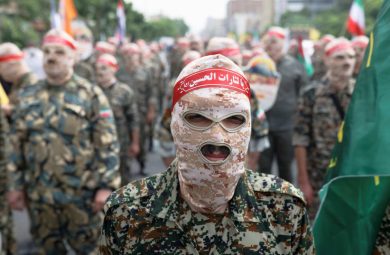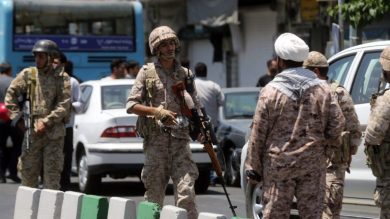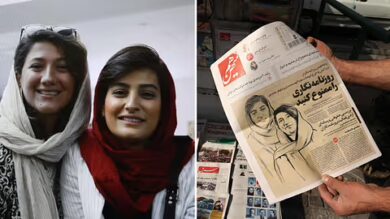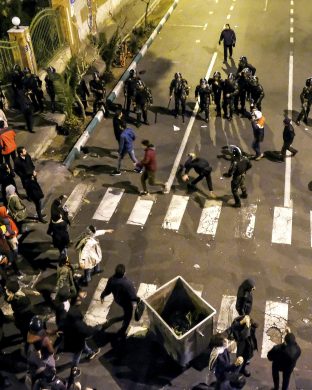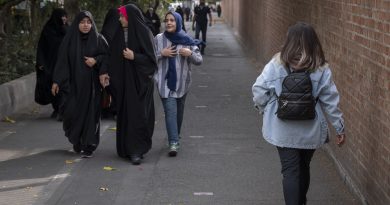The Islamic Revolutionary Guard Corps (IRGC) remains a pivotal force in Iran, with influence extending beyond its military functions into political, economic, and ideological spheres. The IRGC’s involvement in terrorism, regional destabilization, human rights abuses, and suppression of dissent has made it a focal point of global concern. In response, the international community has adopted various strategies to counter the IRGC’s influence, ranging from sanctions and military actions to diplomatic pressure. However, these responses have met with mixed success, revealing both the strengths and limitations of global efforts.
This report examines the successes, failures, and challenges of global responses to the IRGC and offers recommendations for a more effective path forward
1. The Global Perception of the IRGC
A. Why the IRGC is Targeted
. Terrorism and Proxy Warfare: The IRGC, particularly its elite Quds Force, funds, arms, and trains militias like Hezbollah, Hamas, and the Houthis, fueling conflicts across the Middle East.
. Human Rights Abuses: The IRGC plays a central role in suppressing protests, censoring media, and targeting minorities within Iran.
. Regional Destabilization: Its involvement in Syria, Iraq, Yemen, and Lebanon has prolonged wars, deepened sectarian divides, and undermined regional stability.
. Nuclear Ambitions: The IRGC is linked to Iran’s nuclear and ballistic missile programs, raising international security concerns.
B. Designation as a Terrorist Organization
. The United States designated the IRGC as a Foreign Terrorist Organization (FTO) in 2019, while other countries, such as Canada and Saudi Arabia, have imposed similar classifications or sanctions on its leaders and entities.
2. Global Responses: Successes
A. Sanctions
. Economic Impact:
. Sanctions targeting IRGC-controlled sectors (oil, construction, and telecommunications) have constrained its funding and restricted its ability to finance proxies.
. Targeted Measures:
. The U.S. and EU have sanctioned individual IRGC leaders and affiliated entities, freezing assets and limiting their international mobility.
B. Military Deterrence
. Targeted Strikes:
. The U.S. killing of Quds Force commander Qassem Soleimani in 2020 significantly disrupted the IRGC’s leadership structure.
. Proxy Disruptions:
. Regional powers like Israel and Saudi Arabia have conducted military operations to counter IRGC-linked groups and disrupt arms shipments.
C. Diplomatic Pressure
. United Nations Resolutions:
. UN arms embargoes have limited the IRGC’s ability to acquire and export advanced weaponry.
.Multilateral Alliances:
. Coordination between the U.S., EU, and Gulf states has strengthened collective efforts to counter IRGC influence.
D. Cyber and Intelligence Operations
. Cyberattacks targeting IRGC networks have disrupted its communication and financial operations.
. Intelligence-sharing among allies has exposed IRGC activities, leading to targeted responses.
3. Global Responses: Failures and Limitations
A. Ineffective Enforcement of Sanctions
. Evasion Tactics:
. The IRGC uses front companies, smuggling networks, and cryptocurrency to bypass sanctions and maintain funding.
. Weak Compliance:
. Some countries, including China and Russia, continue economic and military ties with Iran, undermining global efforts.
B. Strengthening of the IRGC’s Domestic Role
. Exploiting Sanctions:
. The IRGC portrays itself as a defender of national sovereignty, using sanctions to consolidate power and suppress dissent.
. Economic Monopolization:
. Sanctions have allowed the IRGC to dominate Iran’s economy further, stifling private sector growth.
C. Regional Spillover
. Prolonged Conflicts:
. Despite international efforts, the IRGC’s proxies remain entrenched in conflicts across Syria, Yemen, and Iraq, contributing to ongoing instability.
. Escalation Risks:
. Military actions against the IRGC or its proxies often provoke retaliatory attacks, risking broader conflicts.
D. Lack of Global Consensus
. Geopolitical Divisions:
. Diverging priorities among global powers hinder coordinated responses. For example, while the U.S. adopts a hardline approach, European nations often prioritize diplomatic engagement.
. Unilateral Actions:
. Unilateral measures by certain countries reduce the overall effectiveness of sanctions and countermeasures.
4. The IRGC’s Adaptation to Global Responses
A. Diversifying Revenue Streams
. The IRGC has expanded its illicit activities, including smuggling, drug trafficking, and black-market trade, to offset revenue losses from sanctions.
B. Strengthening Regional Networks
. The IRGC continues to support and empower proxies, such as Hezbollah in Lebanon and the Houthis in Yemen, ensuring its influence remains entrenched.
C. Enhancing Cyber Capabilities
. The IRGC has invested in cyber warfare, targeting foreign governments, critical infrastructure, and activists to counter external pressures.
5. Recommendations for a Path Forward
A. Strengthen Sanctions Enforcement
. Global Coordination:
. Increase international collaboration to close loopholes in sanctions enforcement and track IRGC financial networks.
. Advanced Technologies:
. Utilize blockchain analysis and AI-driven monitoring tools to detect and disrupt illicit transactions.
B. Support Regional Stability
. Invest in Local Governance:
. Strengthen governance and infrastructure in conflict-affected regions to reduce reliance on IRGC-backed militias.
. Empower Local Forces:
. Provide military and logistical support to governments and groups opposing IRGC proxies.
C. Enhance Public Diplomacy
. Expose IRGC Abuses:
. Amplify reports of human rights abuses and corruption to undermine the IRGC’s domestic and international legitimacy.
. Support Civil Society:
. Fund independent media, NGOs, and digital tools to empower Iranian activists and counter IRGC propaganda.
D. Foster Multilateral Engagement
. Build Global Consensus:
. Work towards unified strategies involving key players, including the EU, Gulf states, and Asia-Pacific nations.
. Leverage Diplomatic Channels:
. Combine pressure with diplomacy to encourage Iran to curtail the IRGC’s activities in exchange for economic relief.
Conclusion
The IRGC’s actions pose significant challenges to regional and global stability, necessitating a multifaceted response. While sanctions, military actions, and diplomatic pressure have yielded some successes, the IRGC’s adaptability and geopolitical complexities limit their overall impact. Moving forward, global efforts must focus on strengthening enforcement mechanisms, promoting regional stability, and empowering civil society to challenge the IRGC’s influence. Only through coordinated and sustained action can the international community effectively counter the IRGC and promote peace and security in the Middle East and beyond.
Join Our Newsletter!
Stay informed with the latest updates, news, and ways to take action in the fight for justice and global security. Sign up now to get updates delivered straight to your inbox!

